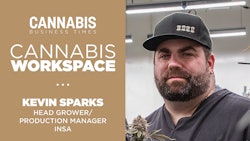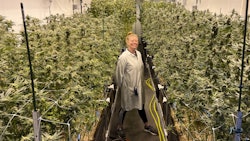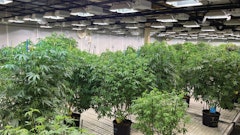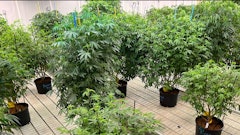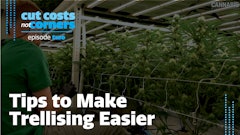
The decisions made early on when mapping out your cultivation start-up will have long-lasting impacts on your chances of success.
Given the evolution of the cannabis industry and the ongoing regulatory changes at the state and federal levels, there are several vital considerations that exist when launching a cultivation business.
From determining your long- and short-term goals to selecting your cultivation method and finding a site location, to genetics sourcing, building a financial model, understanding regulatory and compliance requirements, and much more, panelists at Cannabis Conference 2022 discussed these fundamental considerations and lessons learned in the business.
1. Determine Your ‘Why’
When launching a cultivation business, "it's best to begin with an end in mind," as your end goal can impact multiple factors such as your site location, cultivation method, financial costs and more, said Kyle Landrum, chief production officer at Trulieve, a multistate cannabis operator.
And for Obie and Sarah Strickler of Grown Rogue, an Oregon-based cannabis company, understanding their passion behind the business and their long- and short-term goals were essential in launching the business.
"For Sarah and I and the rest of our team, our focus was on providing high-quality craft cannabis to consumers," Obie said. "A lot of companies got into it with a focus more on the financial end and thinking that there was going to be big dollars created. While money is always important, it's about the consumer, what they are really looking for [and] giving them a product they can enjoy."
Establishing community relationships and being viewed by the community as a "real business" was also very important to Obie and Sarah when launching Grown Rogue, Sarah said.
"For so long, the industry has not been like that. So, building and standing amongst our peers and our community and being identified as a real business and what that looks like [is important]," Sarah said.
And like the Stricklers, for Chris Ball, founder and CEO of Ball Family Farms, a California-based cannabis company, passion is everything.
Ball started selling cannabis when he was 16 years old in the legacy market. At the time, he said it was a "way for him to be cool," but as cannabis became more culturally accepted, his passion for it grew.
"I mean, if you really don't love weed and the process of it, or maybe you're not a user … like me, I was never really a user; I was the middleman, … and I loved brokering weed,” he said. "So, I would say to you, if you don't love it, then get out of this business because it's not just about putting plants in the ground and becoming rich. … I've been in the cannabis industry for 28 years. I'm 44, and I am just now receiving the benefits of my hard work, labor, and even my indictment. So, if you don't love it, then you may not want to be in it."
2. Site Location is Critical
After defining your vision for the business, finding the right site location is critical, Landrum said.
When looking for a site location, it's important to remember regulatory and compliance requirements, and licensing fees vary across states and jurisdictions, Obie said.
"So, your state becomes really important, and I think that goes into what the focus is of how you want to run your business in a super competitive market [or] in a more limited market that might be more expensive,” he said. "And then you have to think about what your cultivation method is going to be."
Whether you’re looking to grow indoors, greenhouse or outdoor, your cultivation method will significantly impact your site location, he said.
For example, Southern Oregon is an ideal place for outdoor cannabis cultivation due to its sunny climate with little rain and humidity, compared to a state like Nebraska, where summers are hot and humid, and winters are cold and snowy.
"[With greenhouse growing] you need a combination of indoor versus outdoor because you get some benefits of the sun, and citing a greenhouse location is going to be super critical," Obie said. "And then when you start thinking about indoor, which you can pretty much build anywhere, you got to start thinking about power costs, which becomes one of your biggest operating costs of where you are going to source that in terms of state, how far it is from the grid [and] what's the reliability."
Ball Family Farms also selects its site locations intuitively.
"We are in Southern California, and it's pretty much one of the most expensive places to grow cannabis," Ball said. "After being there for four years and looking at how much it costs us to produce a pound of weed, … we've decided to get our next license in Oklahoma, and the reason we chose Oklahoma was for the things Obie is talking about. …. The cost, the price per kilowatt per power, the price for land, minimum wage, state taxes–all of these things [affect] your bottom line."
3. Create Community Partnerships
Establishing credibility and trust with local community leaders and those who will work with you through the licensing process is important, Sarah said.
As the director of community relations for Grown Rogue, she sets up site tours or often speaks with local community leaders to educate them on the business side of cannabis, the regulatory and compliance requirements in that area, Grown Rogues’ goals and more.
"That was a critical path to success for us," she said. "We went to them and said what we were trying to accomplish and asked how we could work together. … at the time … we didn't know if we could construct our 30,000-square-foot facility. We didn't know how to do that properly [by] using the right codes. We needed help from our city folks who understood that process better than we did, so we definitely needed to build out those relationships, and it went great.”
4. Financial Considerations
One of the most critical considerations when mapping out your start-up is raising capital. Owners typically do the bootstrap method, where they invest their own money, start small and reinvest profits, or they seek outside investors, Obie said.
Ball used the bootstrap method and funded Ball Family Farms with money he earned from operating in the legacy market.
He and his team started small with one grow room and 30 lights, and as they harvested and sold the product, they took that money to build another room and would reciprocate the process until they built out the entire facility, he said.
After you determine where your financing will come from, it's also crucial to factor in the time it will take to scale and monetize—something that Grown Rogue struggled with early on, Obie said.
"We built these nice models, we understood where our capital was going to come from, [but] we didn't really account for the realities of construction delay," he said. "We all thought we were going to harvest and sell within the first week, and that's not really how it works–you have to build your sales force in order for your revenues to be able to come in."
5. Facility Design
When designing your cultivation facility, the biggest takeaway is to "keep it simple," Landrum said, adding that you don't need high-level and costly equipment to succeed.
For example, Landrum said his first environmental monitoring control was a piece of paper and pencil that he taped to the wall.
Ball also said to start small and learn from your mistakes before investing in costly automated machines.
"I studied how to grow weed, and when you study, you realize less is more," Ball said. "Get a room, start in a closet if that's what you need to do, and make your mistakes. It took me a year of growing to get through my first harvest successfully. … Start with the basics and learn how to get through the harvest. … Once you establish yourself, then get the bells and whistles because what the bells and whistles do is make your job a little bit easier … but you've got to earn it. If you come into this space and try to just go there, you will lose. Less is more; learn the plant first."
6. Genetics Sourcing
"Genetics is what is going to set you apart and is what is going to get you through," Ball said. "I started my company with one strain. When I was growing that strain, and I was going to come to market, all the experts told me I was going to fail and that I didn't have enough variety for the public. … That genetic is still my number one selling strain to this day."
Ball said when sourcing genetics, growers should understand what consumers want, the different terpene profiles, what they mean, their effects, their taste, how long it will take to run and more.
"Cannabis is like fashion," he said. "Every season, there's a new strain, there's a new terpene profile, the consumer wants something new. The palette doesn't stay consistent, so you need to always keep up with the latest strain, just like you keep up with the latest fashion. … As the industry and consumers mature, the terpenes start to progress. So, you have to be in tune with that if you are going to be successful."
He added that growers should also be wary of sick genetics, as there are many in the marketplace that could hinder your operation's success.
"Genetics [are] extremely important for ... health reasons," Ball said. "You can do everything right, but if that genetic is sick, it will not make it through harvest. … one thing to take away is to make sure you have healthy genetics, and to get those, you can pop seed, and if you don't know how to do that, find a genetics company that you trust and buy your first round of genetics from them.
"But I would implore you and encourage you to study how to pop genetics from seed and understand how to germinate so that you create your own genetics in house, and you don't have to go out and search for them anywhere else."
7. Your Team Impacts Success
Your team directly correlates to your business's success.
Sarah said she and Obie built the Grown Rogue team around the company's core values: trust, transparency, honesty and education.
"Those were the things that we kept going back to, so we wanted to identify and build a team around those concepts," she said. "Obie and I knew we couldn't do it alone. … a lot of our process was learning how to let go and trusting our team a little bit to do the work and do the craft that they were meant to do there, so it's been vital to surround ourselves with the right folks."
For Ball, he said in coming from operating in the illicit market to the legal market, it was crucial he surrounded himself with people he could trust: his family and a few close friends.
"When you are thinking about doing this, make sure the people around you have just as much passion," he said. "It's going to take a village, and all you guys have to be communicating, and everyone has to be on the same page because, if you're not, all the plants will feel it."
Editor's note: Join us this year at the Paris Las Vegas Hotel & Casino for Cannabis Conference, the leading education and expo event for plant-touching businesses. Cannabis Conference is debuting a day-long “How to Launch a Cultivation Business Workshop,” available as an add-on for registrants, that will explore all the intricacies of cultivation startups.










